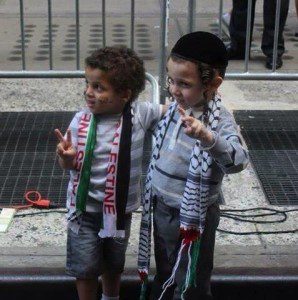 We live in a world that loves to draw lines between “us” and “them.” This line-drawing has grown very loud in recent days between supporters of the two sides in the Israel/Gaza conflict. Either it’s God’s chosen people vs. a degenerate race of terrorists or it’s the colonial racist imperialists vs. their oppressed victims. Both easy narratives are deeply unjust to the history of the conflict. Many evangelical Christians in my generation “stand with Gaza” at least partly because our parents’ generation is so disgustingly shrill in the way that they “stand with Israel.” But Christians are supposed to bear an entirely different witness to the world in terms of what we stand for and against. We are supposed to be against the enmity and demonization of anybody and in support of the human dignity of all people. Our understanding of the universal sinfulness of humanity and the unconditional mercy of God ought to lead us to the conclusion that the two sides in every human conflict aren’t really the human players involved but the two voices that compete for each of our souls: God and Satan.
We live in a world that loves to draw lines between “us” and “them.” This line-drawing has grown very loud in recent days between supporters of the two sides in the Israel/Gaza conflict. Either it’s God’s chosen people vs. a degenerate race of terrorists or it’s the colonial racist imperialists vs. their oppressed victims. Both easy narratives are deeply unjust to the history of the conflict. Many evangelical Christians in my generation “stand with Gaza” at least partly because our parents’ generation is so disgustingly shrill in the way that they “stand with Israel.” But Christians are supposed to bear an entirely different witness to the world in terms of what we stand for and against. We are supposed to be against the enmity and demonization of anybody and in support of the human dignity of all people. Our understanding of the universal sinfulness of humanity and the unconditional mercy of God ought to lead us to the conclusion that the two sides in every human conflict aren’t really the human players involved but the two voices that compete for each of our souls: God and Satan.
Christians believe two basic things that ought to be the foundation for how we understand every conflict between people in the world: 1) Everyone including us is a sinner utterly lost without the grace of God (though people also do many good and beautiful things because of the grace of God). 2) We are commanded to love our enemies, which we can only do with sincerity if we really believe that we are just as sinful as they are. These two beliefs ought to disqualify Christians from ever thinking in “us vs. them” terms about any group of people. The degree to which we feel comfortable categorically condemning another group of people is the degree to which we are making it clear that we do not see ourselves as sinners standing on the grace of God alone. Jesus addresses this issue in his parable of the unmerciful servant in Matthew 18:21-35.
Because we ought to be free from the insidious practice of dividing the world into “us vs. them,” Christians ought thus to to see the two spiritual forces that are really at war beneath every human quarrel. It’s two voices that organize the universe in two kingdoms, one that the Bible calls “the world” or “the kingdom of the air” and the other one being “the kingdom of God.” Whenever we think of our quarrels in “us vs. them” terms, we have already taken one of these two sides; we have been seduced by the voice of the devil. The voice of the Holy Spirit is the voice through which God is constantly “reconciling the world to himself in Christ” (2 Corinthians 5:19) and “putting to death our hostility” (Ephesians 2:16).
The devil has two names in the Bible. His Hebrew name is satan, which means “the accuser” or “the heckler.” His Greek name is diabolos, which is a compound word combining ballo (“to throw”) with dia (“in the midst”), so a good translation for diabolos might be “the bomb-thrower” or, better yet, “the terrorist.” Whether Satan is a real person or an anthropomorphic “black box” label for the spiritual forces of evil, there is a “terrorist” voice in the universe that seeks to create division and enmity between all people. Satan’s goal is to make us all terrorists by making us see everyone else as a terrorist threat to our existence.
The voice of Satan tells us two things: that we ourselves are infallible and that our enemies are utterly despicable and unworthy of human dignity. Eventually, if we let Satan possess us completely, we will come to see everyone around us as enemies, but we start off simply by scapegoating a category of “bad guys” against whom we can define ourselves and our tribe as the “good guys.” As we are seduced more and more by Satan’s terrorist voice, our enemies are not just misguided and foolish, but cruel and fascist and entirely devoid of humanity, until at length, they become the ultimate form of bad guy: terrorists.
Here’s the paradox of terrorism: the way that we become capable of terrorism is by defining our enemies as terrorists, that is people with whom it is impossible to make peace who have forfeited their right to human dignity and deserve to be killed immediately without any trial or attempt at reconciliation. A terrorist is someone who acts on these assumptions against a population of people, though Jesus would tell us that anyone who hates another person or race of people with the perfect hatred of terrorism is a terrorist in their heart (Matthew 5:21-22), whether they have the opportunity to carry out their terrorism in the physical world or not. Furthermore, whenever we terrorize other people with our slander, we create a climate in which they are that much more likely to be terrorized with physical violence.
If we take Jesus’ teaching seriously, then we will recognize that everything we say and share on social media which contributes to the demonization of a group of people such that genocide against them becomes a more socially acceptable idea is an act of ideological terrorism. When we make it our goal in life to prove that the people of Israel or Gaza are utterly monstrous people who deserve to be massacred, then we are no less terrorist than the missiles and rockets and suicide bombs that kill civilians. It’s terrorism for the Wall Street Journal to say that Hamas’ status as the elected political representation of Palestinians means that nobody in Gaza can be called a civilian. It’s terrorism whenever anyone feeds the flames of anti-Semitism by calling Jews Nazis or saying that Hitler was right or, I would argue, saying that the yearning of Jews for a Jewish homeland is racism, pure and simple.
Now there’s a very fine line here which I have stumbled over many times over the past couple of weeks. I think it is critically important to destroy the myth that every civilian who dies in Gaza is a “human shield” who was killed for being inappropriately in the way of a legitimate military target. That has been proved to be absolute bullshit over and over and over again. Gazans who followed Israel’s commands to evacuate and relocate multiple times got bombed and murdered in the places to which they evacuated. Schools and hospitals have been bombed repeatedly. Extended families of more than 20 people have been wiped out who have no connection whatsoever to Hamas. (I can hunt down the links for all of these if you’re not willing to take me at my word.)
Bombing civilian homes as a strategy for collective punishment and “subduing the population” is terrorism, even if there is a Hamas connection to the family. What defines terrorism is the targeting of civilians. What Hamas did in the worst days of its suicide bombings could not be called terrorism if we’re going to say that the families of terrorists are fair game because then Hamas could argue that it never killed anybody who wasn’t at least a family member of an Israeli soldier (since everyone in Israel has either served in the military or will serve in the future).
I get that the Israeli military faces an almost imp0ssibly difficult situation in Gaza. And part of the cost/benefit analysis putting boundaries on their rules of engagement must be zero tolerance from the international community for “shock and awe” collective punishment as a tactic for subduing the Gaza population. Bombing every building within a hundred yards of where a rocket was launched is not bombing a military target (that “hundred yard” figure has been the standard IDF response to accusations of targeting civilians). There are plenty of crimes that happen within a hundred yard radius of urban homes in America (and Gaza is more densely populated than any city in the US). Should every family living in a high-rise ghetto in south Chicago be sent to jail for the drug dealing that happens in front of their building late at night? Again, I get that the shape of the battlefield is extraordinarily difficult, but the Israeli military’s current rules of engagement are unacceptable, because every child that dies in Gaza is a child of God with infinite sacred worth.
That’s what the voice of God tells us. Amidst the relentless bombardment of Satan’s reminders of our infallibility and our enemies’ flaws, God says, “Everyone you hate is my child too; they are sinners whom I love no less than you and whose reconciliation I desire no less than yours.” This compound statement can be derived from two verses from the book of Romans: 1) “There is no difference between Jew and Gentile, for all have sinned and fall short of the glory of God” (Romans 3:23) and 2) “The Spirit himself testifies with our spirit that we are God’s children” (Romans 8:16).
While Satan’s goal is to make everyone a terrorist through self-righteous paranoia about the terrorist threat of everyone else, God’s goal is to make us all children of God who see everyone else as God’s children too. I believe that the Christian gospel makes us uniquely capable of recognizing that we are God’s beloved children by addressing the barrier that sin has created between us and God. Without recognizing the redemption of our sin, it’s a blithe and shallow thing to call ourselves “children of God.” The reason it has meaning is because God has adopted us as part of our rescue from being ensnared by the universe’s terrorist. At the same time, I reject the way some Christians say that we are God’s children while other people aren’t; that seems like a tactic of Satan to give us an excuse for not loving our enemies and pumping ourselves full of self-righteousness. Everyone is a child of God; the question is whether we recognize and live into this reality.
To love your enemy is to say this person is a child of God. It has no meaning if you aren’t willing to hear your enemy’s story and try to understand where your enemy is coming from. That means that those of us who find ourselves called to solidarity with Palestinians cannot just go along uncritically with an oversimplified colonialist critique of Israeli “apartheid.” The ANC in South Africa never did suicide bombing on the scale that Hamas and Islamic Jihad did less than a decade ago. We can’t just say, “Get over those suicide bombings. That’s so 2006!” It is cruelly unfair to try to put a moral statute of limitations on the suicide bombings of the second Intifada just because the world’s attention span is so short.
From Israel’s perspective, their uber-control of the Palestinian population is the only reason that their buses and discos aren’t blowing up to this day. The suicide bombings remain the most tragically stupid and self-defeating obstacle to justice for the Palestinian people; they don’t delegitimize the demands of the Palestinians, but they sowed into Israel a deep paranoia (which has of course been cynically exploited) regarding the need to blockade Gaza and build a land-grabbing apartheid wall in the West Bank. If you consider Israel to be the enemy, then part of loving your enemy is recognizing the legitimacy of Israel’s paranoia.
At the same time, it’s not illegitimate to try to understand where Hamas is coming from. It doesn’t make you a terrorist sympathizer to listen to someone’s story and try to understand it. I would argue it’s a much more effective weapon against terrorism than the bombs which always sow the seeds for future terrorism in the anguished grief of those who lose their loved ones. I realize I’m hopelessly naive, but it’s a naivete that I’ve been commanded to bear as a Christian who doesn’t see the imperative to love our enemies as a suggestion to consider whenever it seems practical. On the contrary, I see learning to love our enemies as the only hope for the future of our world.
The most courageous people in this conflict who are teaching me how to be a Christian even though they aren’t Christian themselves are the Jews who risk their lives and the hatred of their people by infiltrating Gaza as international solidarity activists not to support terrorism, but to stop genocide, as well as Muslim leaders who are willing to befriend and listen to Jews like Imam Abdullah Antepli, the Muslim chaplain at Duke University, who has been attacked for his promotion of an interfaith dialogue program with the Shalom Hartman Institute in Jerusalem.
I would love to be part of creating positive and peaceful interfaith relations between Christians, Muslims, and Jews here on campus at Tulane. I have no idea how to do that. But I’m going to try to reach out to my fellow campus ministers from each respective faith. Mostly, I want to try my best in my everyday battle to follow the right voice in my head, to be a child of God instead of a paranoid terrorist in how I speak and treat other people.










